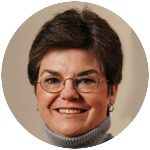
Effie Caldarola
Near the end of “Thirst,” one of my favorite volumes of Mary Oliver’s poetry, she speaks to the Lord in the epilogue: “Love for the earth and love for you are having such a long conversation in my heart.”
When Oliver died in January 2019, I felt a great loss, as if I would be no longer privy to that marvelous conversation that has aided my own dialogue with the Lord and the Earth.
Her death provoked an outpouring of grief on social media. Oliver was America’s best-selling poet, and tributes consisted of people reprinting her own words. They alone would suffice, along with the occasional heartfelt comment, “I loved her.”
[hotblock]
A keen observer of the natural world, Oliver was a herald for our time, combining a love for nature with a quest for transcendence. She and Pope Francis are contemporary prophets of the environment, he with his well-researched “Laudato Si’, on Care for Our Common Home,” she with her eye for the deer, the hummingbird, the sunflower and their meaning in our lives.
“My work is loving the world,” she tells us in “Messenger.”
She let us know what was important: “Are my boots old? Is my coat torn?/ Am I no longer young, and still not half-perfect? Let me/ keep my mind on what matters/ which is my work/ which is mostly standing still and learning to be astonished.”
I am no longer young and certainly not half-perfect. Environmental calamity can keep me up at night. The recent “60 Minutes” reports on plastic filling our waterways horrified me. By 2050, at the present rate, there will be more plastic in our oceans than fish, and the breakdown of plastic results in seafood consuming that plastic. That delicious fillet of salmon you love? Enjoying the plastic micro-particles in it?
I rejoice when my parish commits to zero waste at celebrations and potlucks, contracting with the same company that composts paper and food waste for a local Catholic girls school. We wash utensils. We carry canvas bags to the grocery store and our own reusable mugs to the coffee shop. We turn the heat down, bring reusable “doggy bag” carriers to restaurants, save and reuse bread wrappers.
[hotblock2]
We try to remain people of hope believing that through the cross we are ultimately people of resurrection.
Mary Oliver didn’t talk about these practical steps.
Instead, in her poem “Making the House Ready for the Lord,” she talked about the creatures of the natural world and said that when she welcomed them — the sparrow, the lost dog — she could tell the Lord, “really I am speaking to you whenever I say, as I do all morning and afternoon: Come in, Come in.”
These early spring mornings, I keep my eye on the empty bird’s nest that has perched all winter on a barren tree branch outside the window where I pray. Little birds visit, as if checking out a bird condo open house.
In the front yard, a rabbit has made a home in some bushes and thinks she is keeping this a secret from me.
We are, all of us, part of the whole creation and part of the crisis that confronts our natural environment. We are all encouraged to welcome the Lord by loving his world.
While we commit to being activists, we also commit to “learning to be astonished.” We learn to quiet down and pray. We learn to understand the nearness of the Creator to the things of this earth and the interrelatedness of all.
From this respect and astonishment, we draw strength for action.



Share this story